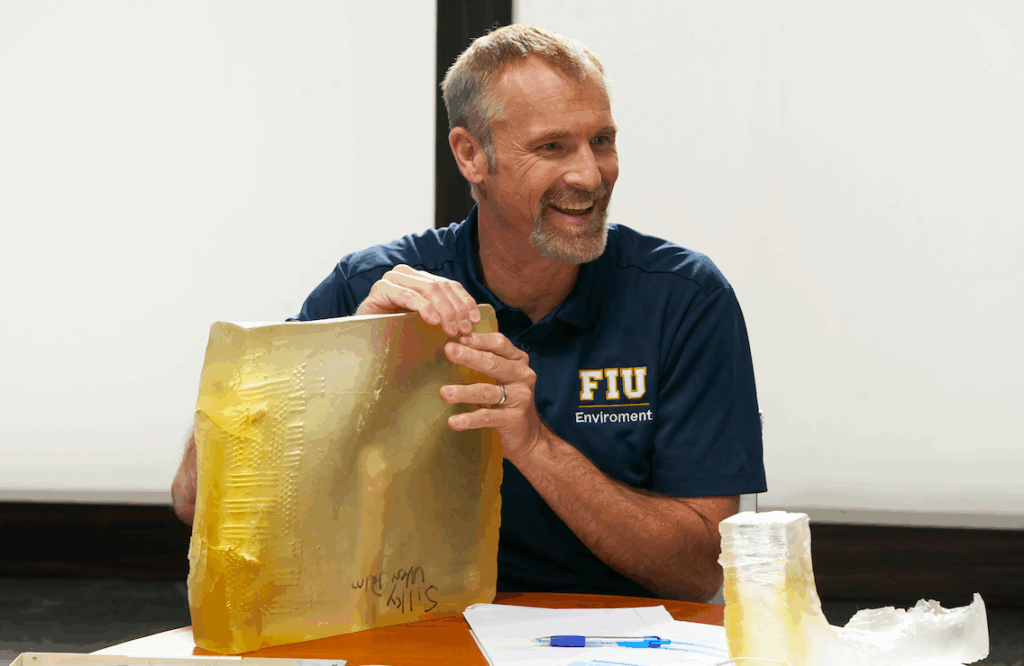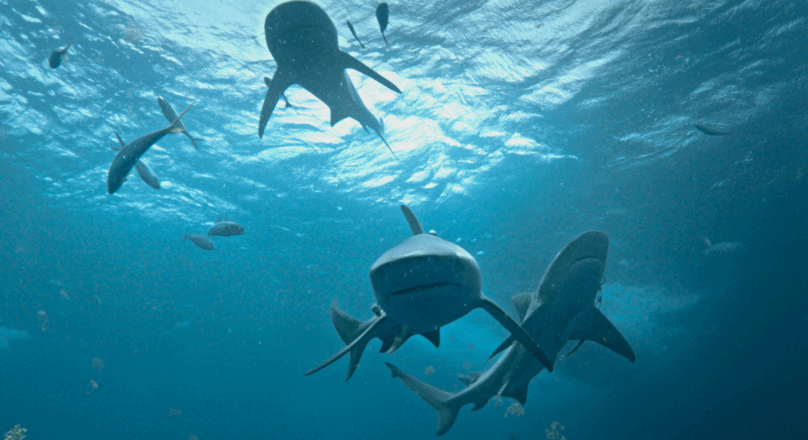Photo: Sharkfest 2025 features the new series Investigation Shark Attack. Photo courtesy of Cineflix 2025 / Ian Watson / Provided by Nat Geo with permission.
Nat Geo’s Sharkfest is an annual tradition that delights many fans of nature-based content on television. This summertime spectacle features a number of documentaries, series and specials, all focused on the apex predators of the ocean, but the goal of the programming isn’t fear. This is not a sequel to Jaws. Instead, following Nat Geo’s mission of promoting educational entertainment, the shows on Sharkfest are grounded in science, with experts offering their research answers to the many puzzling questions surrounding these creatures of the sea.
Dr. Mike Heithaus, dean of the College of Arts, Sciences & Education at Florida International University, is one of the voices on this year’s Sharkfest. He’s featured in the new series Investigation Shark Attack, along with Candace Fields, Gibbs Kuguru and Dr. Megan Winton.
Sharkfest runs July 5-20, with Investigation Shark Attack’s first episode premiering Saturday, July 5, at 9 p.m., and available to stream July 6 on Disney+ and Hulu.
“I think that TV is really critical in changing public perceptions of sharks,” Heithaus said in a recent Zoom interview. “It’s been a long, hard road, but there’s that innate fascination that even started back with Jaws and some of the movies, but now has really moved into people learning about sharks. People want to hear about shark attacks and that danger, but what’s really exciting to me is that people are now really interested in: How do we know about these sharks? How important are they in ecosystems? Just learning how amazing they are as animals, and so I think as people learn more about them, there’s much more interest in protecting them and making sure that we have healthy shark populations out there.”
Heithaus’ fascination with sharks may have started when he was only 18 months old. His mother used to tell him that’s when he actually caught a fish in his diaper at the beach, and ever since, he’s been interested in the marine world.
“I just always loved going fishing and watching Jacques Cousteau, Eugenie Clark, David Attenborough on TV,” he said. “I just always wanted to do that, even growing up in the cornfields of Ohio, which is one of the reasons it’s so special to be able to work with Sharkfest and do TV because I know it makes a difference in inspiring people whether they become scientists or not.”
Heithaus added: “I may have to give up my shark card for this, but I actually was really interested in dolphins to start with. So my journey to sharks started with my interest in dolphins and then seeing that dolphins had these big bites on them and were not going to the buffet table to eat and thought maybe that’s because it was dangerous, so I thought we probably knew everything we needed to know about sharks. I just had to read a few papers, and it turns out we knew almost nothing. And so being kind of a sucker for a challenge, I started working on sharks myself and have been in this field ever since, and so it’s that initial fascination and kind of following the curiosity through time.”
When Heithaus first began his career in marine ecology, there were a lot of unknowns surrounding sharks. Thanks to lots of research over the decades, some of those blanks have been filled in, but these finned creatures remain elusive and mysterious.
“We know pretty well where they’re moving in the oceans,” he said. “We know pretty well what they are eating, but one of the things we’re trying to figure out is how important are they in ecosystems. And we’re starting to peel back that and find out that they can be absolutely critical to maintaining healthy oceans in some situations, and then as we get more technology, we’re getting some really new and amazing insights into the fact they may have social behavior we never thought.”
Heithaus said the dominant theory was that sharks were individual loners, and although they do not have the same social interactions as dolphins, sharks sometimes “hang out” with a few select friends. This behavioral distinction fascinates Heithaus.
“Now we’re having to learn a lot more about how they sense their world, how they interact with prey because as we slowly turn the corner to rebuilding shark populations, which were completely wiped out in a lot of places, they’re starting to interact with people fishing more, and so we want to make sure we can balance super-healthy oceans and shark populations with people using oceans the way they need to,” he added.
Heithaus called Investigation Shark Attack an exciting TV project for him and the team. Often these series and specials focus on the human victims in a shark attack incident, but this Sharkfest offering actually looks closer at the sharks themselves.
“This one is really about the sharks,” the expert said. “We’re trying to get a shark’s eye view of why are they in these areas, what is their behavior and why might they have bitten someone, and so it’s a lot more shark-focused. And there’s a lot of really cool shark biology that people are going to get. Megan Winton, Gibbs Kuguru and Candace Fields are fantastic shark scientists, and so for the four of us to be together with our different expertise to think through these things, that was really special. And I think audiences are going to learn a lot and have fun doing it.”
When Heithaus is investigating a shark attack, he needs to consider the many unknowns. Perhaps the most profound uncertainty is what was going through the shark’s brain when it attacked.
“You can never really get in the mind of that shark completely, but a lot of times it’s something the person has done,” he said. “You’ll see that a number of these incidents, people are in areas where there is a whole lot of bait. People tend to think about these big shark bites, like white sharks or tiger sharks, but a lot of the bites are from smaller sharks. And it’s people swimming in a school of mullet, and a hand or foot may look like it’s bait. And so you get bites that way. Most of the time, it’s just bad luck, being in the wrong place at the wrong time, and sharks generally in these cases are making mistakes.”
Sometimes a person wakes up a shark, and that can be the cause of an attack. That might seem ridiculous, but that theory is put to the test in Investigation Shark Attack.
“A person didn’t necessarily do anything wrong other than stumble into or jump in, and there was a shark that happened to be there,” Heithaus said about the randomness of attacks. “I think one thing that we have to keep in mind, especially when we’re looking at these shows with the shark incidents, the number of these worldwide is so low every year relative to how many people are on the beaches. We’re really trying to decide what may have happened in a very rare situation already, so we don’t want people to get the idea that this is happening all the time. … We’re really trying to put ourselves in the mind of the shark in terms of why are they in certain areas, what habitats are they in, what might they be feeding on. That can give people some rules of thumb of how to change their behavior if they’re worried about sharks, and one of the first things is always talk to your local lifeguards because they know what the conditions are and where different dangers might be. And sometimes that’s sharks, but a lot of times it’s rip currents or other things in the ocean that are actually quite a bit more dangerous than the sharks.”
By John Soltes / Publisher / John@HolywoodSoapbox.com
Sharkfest runs July 5-20 on Nat Geo, with streaming available on Disney+ and Hulu. Investigation Shark Attack premieres Saturday, July 5, at 9 p.m. Click here for more information.
 Dr. Mike Heithaus, of Florida International University, is one of the experts featured in Investigation Shark Attack. Here, he’s demonstrating a pad used to analyze shark jaw impressions. Photo courtesy of Cineflex 2025 / Ian Watson / Provided by Nat Geo with permission.
Dr. Mike Heithaus, of Florida International University, is one of the experts featured in Investigation Shark Attack. Here, he’s demonstrating a pad used to analyze shark jaw impressions. Photo courtesy of Cineflex 2025 / Ian Watson / Provided by Nat Geo with permission.
